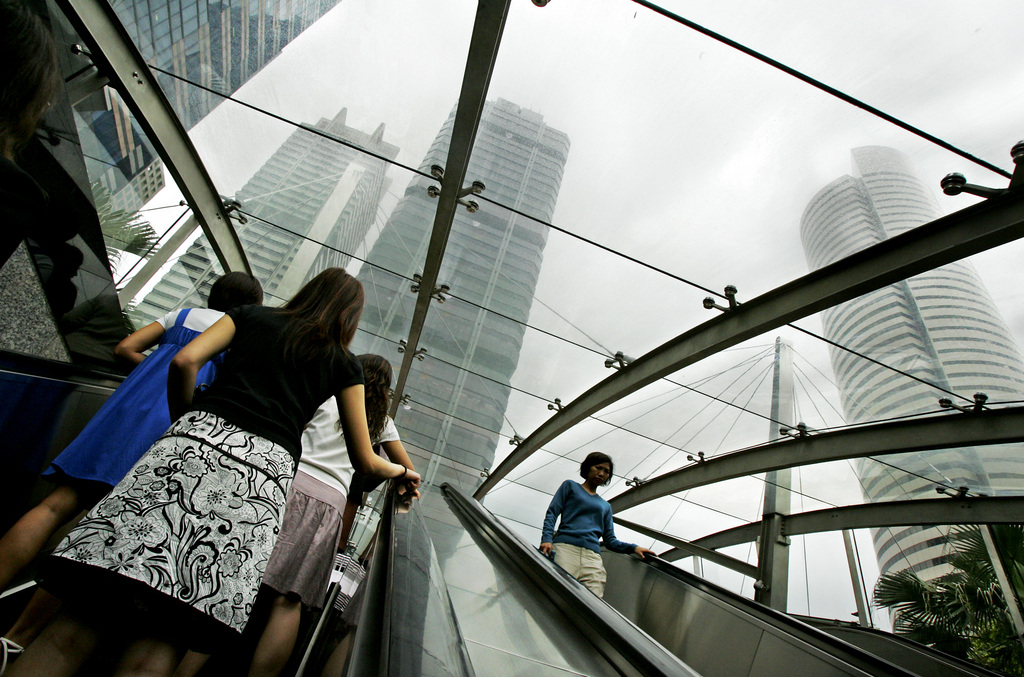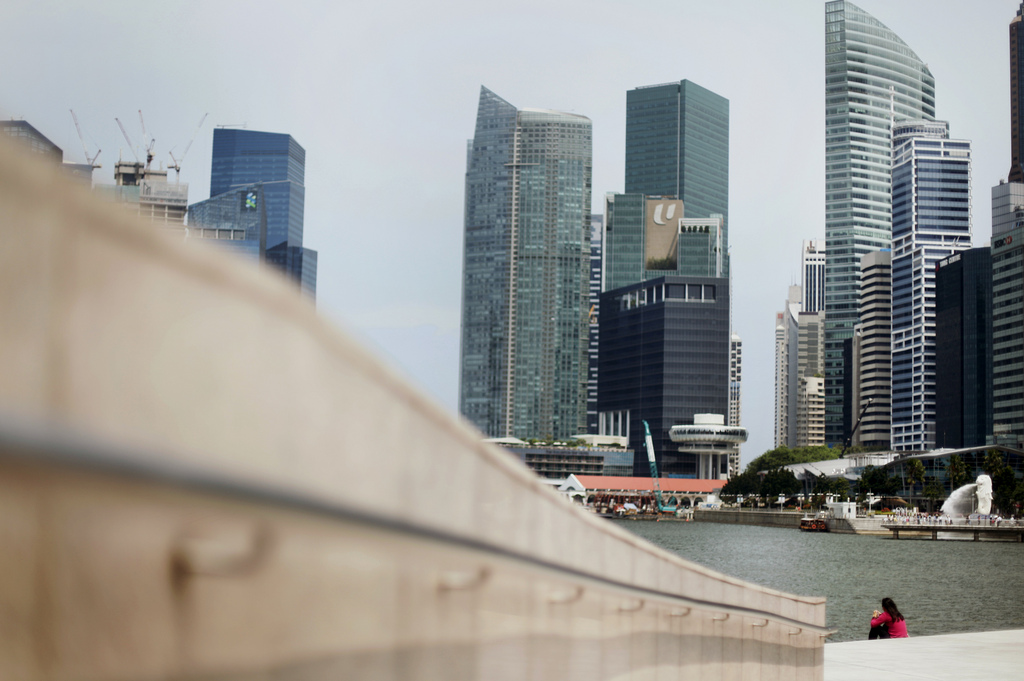Tax evasion controversy shifts east

Having taken over the mantle of the world’s fastest growing wealth management magnet from Switzerland, Singapore should now take centre stage in bringing the industry out of the shadows, according to an Asian private banking expert.
Philip Marcovici, who has advised governments such as Liechtenstein on addressing the crackdown on tax evasion, spoke to swissinfo.ch after recent revelations from the International Consortium of Investigative Journalists. The ICIJ has accused Swiss banks of helping relatives of Chinese leaders set up opaque financial structures in far flung tax havens.
The ICIJ claims, using data obtained from entities based in Singapore and
the British Virgin Islands, do not prove criminal activities. But the findings cannot fail to cast doubt on the industry after high profile clients were investigated and prosecuted following similar revelations last year from the Washington-based media organisation.
“Singapore has already taken its first steps towards tax transparency, but it needs to do more,” Marcovici told swissinfo.ch. “Singapore now has the responsibility, given its growing dominance in wealth management, to provide the kind of leadership in this area that Switzerland failed to show us.”
But Singapore cannot do the job alone, he added. “There needs to be a lot more global dialogue and leadership because there is a legitimate role for offshore facilities, providing that people play by the rules.”
In January, the International Consortium of Investigative Journalists (ICIJ) released details of some 22,000 clients on mainland China and Hong Kong that had opened offshore companies and trusts in tax havens.
Among the names were relatives of current of former Chinese Communist Party leaders with opaque constructs in the Cook Islands or British Virgin Islands.
Swiss banks UBS and Credit Suisse were named by the Washington-based media group as having helped set up some of these structures.
The Swiss Tages Anzeiger newspaper named Credit Suisse as having helped the son of former Chinese premier Wen Jiabao set up an offshore company in 2006, a year after it became the first Western bank to obtain a private banking joint venture on mainland China.
Both Credit Suisse and UBS were also alleged to have assisted other Chinese officials and their relatives move assets to offshore locations in recent years.
The recent media reports have cast suspicion on the transactions, but have not proved that they were illegal or immoral.
Raking in the money
The ICIJ reports include numerous references to Hong Kong, the Cook Islands and the British Virgin Islands. But Singapore, home to the Portcullis Trustnet offshore specialist firm, is also named as a key figure.
Situated in the heart of the most economically vibrant corner of the world, Singapore’s wealth management industry grew 22% in 2012 to 1.63 trillion Singaporean dollars (CHF1.15 trillion). Industry research group WealthInsight expects Singapore’s share of global offshore wealth to outstrip Switzerland by 2020.
The Singapore financial regulator, the Monetary Authority of Singapore (MAS), is alert to growing suspicions that not all of the assets that it attracts are clean. The island state has signed up to tax information exchange programmes while making it a criminal offence for banks located there to accept undeclared or laundered money as of July of last year.
“Our message to tax criminals is loud and clear: their money is not welcome in Singapore. And our message to our financial institutions is also loud and clear: if you suspect the money is not clean, don’t take it,” MAS Managing Director Ravi Menon said at the time.
But not everyone is confident that Singapore is following up its words with actions. Opposition politician Kenneth Jeyaretnam, Secretary-General of the Reform Party, has campaigned for years against perceived corruption in Singapore.
“While Singapore pays lip service to information exchange, it continues to turn a blind eye to assets derived tax evasion and outright theft,” he told swissinfo.ch. “A lot of Singapore’s financial centre growth comes from the perception that Switzerland’s banking secrecy has deteriorated.”
Different standards
Swiss bankers, both in Singapore and in Switzerland, say that the MAS is one of the strictest regulators in the world, often demanding information and making regular spot checks on local branches.
Off-the-record, however, some Singapore-based experts believe that the toughened stance has been adopted mainly to appease the United States and Europe and to avoid the same type of backlash visited on Switzerland by the Western powers in recent years.
Singapore is surrounded by countries generating high levels of wealth such as Indonesia, Thailand and the Philippines. The suspicion remains that inflows of funds from these states is not subject to the same scrutiny as afforded to US clients.
“It may well be the case that different approaches, at this stage, are being taken in respect of different countries, with less urgency and a lighter touch applying to assets coming from developing countries, many of which are its neighbours, than to assets originating from Western Europe and the US,” Marcovici told swissinfo.ch.
“But this is not just a Singaporean issue. This is a reality that is being replicated across the globe, including Switzerland, London, Hong Kong and the US, as the world adapts to the competing issues of increasing tax transparency and the proper privacy needs of wealthy families.”
At the World Economic Forum in Davos in January, Indian Finance Minister Palaniappan Chidambaram criticised his Swiss opposite number, Eveline Widmer-Schlumpf for failing to assist Indian requests for help in tracking down tax evaders.
Switzerland responded to the allegation by saying it would not help countries use stolen Swiss bank data in the search for tax offenders. India is thought to have bought a copy of data stolen from the Swiss branch of HSBC.
The Swiss media seized upon this war of words to suggest that the proposed free trade agreement between the two countries might be sunk by the impasse.
But other observers pointed out that the FTA, that reaches a critical deadline at the end of February, is far more likely to stall or even fall on the demands of Swiss pharmaceutical companies for better drug patent protection in India.
Turning a new leaf
Credit Suisse, which have been most widely implicated in recent press reports concerning Chinese Communist party officials, said they could not comment on individual client relationships.
“Credit Suisse has a detailed procedure for the handling of relationships with politically exposed persons (PEPs). This procedure is in line with anti-money laundering regulations and standards in Switzerland and in major financial centers,” the bank said in a statement.
The Swiss Financial Market Supervisory Authority (FINMA), that regulates the financial centre, said it had made initial enquiries about the allegations. “We are in contact with bank in the scope of our general supervisory capacities,” spokesman Tobias Lux told swissinfo.ch.
Switzerland has gone to some lengths in recent years to persuade the world that it is cleaning up its act. Having imposed a ‘clean money’ strategy on the Swiss financial centre, the government last year told banks to hand over confidential data to the US authorities to finally mop up an long running row over tax evasion.
Some 106 Swiss banks signed up to the deal at the end of last year.
In addition, Switzerland has beefed up assistance to help other countries find tax evaders and has signaled potential readiness to sign up to an automatic exchange of tax information provided a global set of rules can first be agreed.

In compliance with the JTI standards
More: SWI swissinfo.ch certified by the Journalism Trust Initiative












You can find an overview of ongoing debates with our journalists here . Please join us!
If you want to start a conversation about a topic raised in this article or want to report factual errors, email us at english@swissinfo.ch.